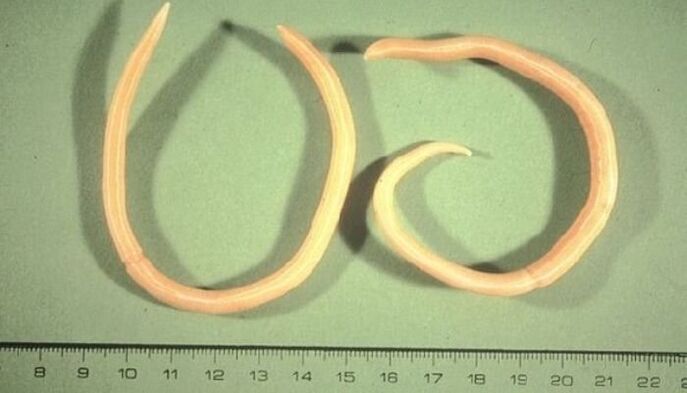
Heartworm disease is one of the most unpleasant and vile diseases. Parasites live in the human body, poisoning the body and causing chronic diseases. You can have the disease for years without even knowing it - this stage of helminthiasis is known as an eradication process.
Since it is not possible to completely prevent the entry of worms into the body, it is important to know the symptoms they cause, not only in childhood but also in adulthood.
First symptom
The main danger of the disease in the early stages is that it is quite difficult to detect the parasites. Symptoms often coincide with the cause of other diseases.If you notice the following sensations and signs, you should get tested for worms:
- unreasonable temperature rise;
- abnormally enlarged lymph nodes;
- soreness in muscle tissue and pain in joints;
- teeth and skin become yellow;
- anal itching;
- increased taste;
- periodic rashes appear on the skin;
- swelling in the legs, hands, and fingers;
- diarrhea;
- abdominal pain and bloating;
- bitter taste in the mouth;
- frequent snoring;
- insomnia or restless sleep.
Similar symptoms with 70% probability signal an invasion. You should immediately consult a doctor and get tested for parasites.
Important!Even if the physical examination of stool and blood shows no worms, you should still take the medications prescribed by your doctor. Analyzes are not always able to detect helminths the first time.
Intestine
The gastrointestinal tract is the main residence of the parasites, although they can spread to any internal organs. Knowing what symptoms exist, you can successfully narrow down the list of helminths that have already settled in the body. By what signs to identify worms in the digestive tract?
- One of the symptoms is joint and muscle pain.
- Fever state.
- Weakened immunity and the development of various diseases of the gastrointestinal tract.
- The total number of eosinophils (a subspecies of white blood cells) in the blood becomes larger.
- Allergic reactions occur.
Tapeworms cause the appearance of manifestations similar to those of roundworms.If you detect such signs, you should consult a doctor and undergo a comprehensive examination to look for different types of parasites.

Lung
Equally dangerous are the parasites that have already settled in the respiratory system. In some species, the development cycle necessarily includes the passage of larvae through the host's lungs. They then return to the intestines through the mouth when swallowed.Possible signs:
- First of all, pain and tingling in the chest appear.
- Dyspnea: a person accompanied by shortness of breath and episodes of asphyxiation.
- There is a lung infection with parasites against the background of an unpleasant and weakened state of the whole organism.
- Body temperature rises rapidly.
- The patient woke up in the morning after coughing up phlegm.
- There are problems with the organs of vision.
- People with widespread allergies.
- Infected people lose their appetite. There are signs of poisoning with poison.
- Increased headache.
- Vomiting and nausea.
Liver
In the largest human gland, which performs many important functions, worms also settle. They interrupt its work, causing dangerous diseases.The following symptoms may occur:
- Due to the activity of the parasites, anemia develops. Hemoglobin concentration and total red blood cell volume decreased. Attention is not focused. The patient has pale skin and gets tired quickly after any activity.
- The chair is liquefied.
- Symptoms such as swelling and itching appear.
- Feeling of pain in the whole body.
- The patient developed a fever and began to lose weight rapidly.
- A person infected with worms is constantly sick and vomiting.
- Significantly reduces cravings.
- It seems that the liver has become larger in size.
- Severe stinging nettle rash.
- The patient looks sick.
Important!In severe cases, parasites in the liver lead to neurological disorders, duodenal ulcers, irritability, headaches and other dangerous consequences.

Eyes or brain
The extreme danger to human life and health is presented by the worms that have chosen the organs of vision and the brain as their habitat. Timely diagnosis of parasites in these places will avoid brain damage and blindness.
- Eye damage is manifested as follows:
- The conjunctiva becomes inflamed due to the larvae trapped in it.
- The eyelids swelled up like a boil.
- The patient feels something move in the eye.
- Long ornate lines appear on the skin of the eyelids.
- Conjunctivitis is one of the consequences of infection of the organs of vision by parasites.
- Brain damage is manifested as follows:
- Nervous tension and depression.
- Difficulty sleeping leads to chronic insomnia.
- Drinking becomes difficult. Drinking a lot of strong drinks causes severe pain in the head.
- The back of the head and temples are the main pain points.
- Depression doesn't stop, it just gets worse.
- During a headache, the person infected with the parasite is constantly sick and wants to vomit.
- Sudden problems with the eyes begin.
Only a qualified physician can accurately determine the diagnosis. In addition to treatment and hospital examination, if possible, patients should contact laboratories that specialize in diagnosing parasites.
The most common symptoms
Many signs of infection are common to most roundworms or tapeworms. After identifying the main consequences, it is necessary to move on to identifying a specific parasite for effective treatment with a suitable drug. Possible symptoms of helminthiasis:
- A skin rash is one of the main signs of a parasite infestation. It can be common acne, chiria, papillomas, urticaria or eczematous nodules.
- A chronic cough that doesn't go away after taking antibiotics and expectorants.
- The reduced immunity does not allow the patient to get out of the constant cold.
- The movement of worms inside the body causes severe pain in the joints.
- Obstruction by large helminthic foci of the rectum, pancreas and gallbladder is manifested by constipation and abdominal distension.
- Increased nerve activity causes teeth grinding.
- Problems with the work of the gastrointestinal tract cause discomfort.
- Inflammation of the upper respiratory tract accompanied by a runny nose, pneumonia and other diseases. Especially such symptoms are characteristic of diseases with strongyloides (intestines) and roundworms (ascariasis).
- Metabolic disturbances and toxicity by products of worm action induce chronic depressive states.
Symptoms will allow an experienced therapist to distinguish a parasitic infection from diseases with similar signs. In the active reproductive period, the diagnosis is clarified with the help of tests.

Symptoms of infection in children
Worms are very dangerous for younger representatives of the human race. Timely detection of parasites in children is essential for their healthy development. Sometimes the signs of worm infection on the child's body look quite harmless, so parents need to be very attentive.
- If your child snores and does not sleep well then you should think about having pinworms in the delicate body. They affect brain tissue, causing neurological reactions.
- General and local manifestations of allergic reactions are also features of infiltration. Giardia causes the following common reactions: cracked nails, bronchial asthma, rhinitis. Local reactions have signs such as: itchy skin, dry cough and myocardial spasm.
- Consequences of a weakened immune system in children are inflammation of the paranasal sinuses (sinusitis), damage to the oral mucosa (stomatitis), inflammatory processes in the female organs (vulitis) and inflammation. vaginal bacteria.
- Ascariasis and filariasis (widespread tapeworm) cause aggression and irritability in children. This happens because the brain is poisoned with helminthic waste.
- Hormones produced by certain types of parasitic worms cause malabsorption of fluids in the digestive tract. This leads to disordered stools and diarrhea.
If a person is infected with worms, what symptoms can be detected regardless of age? From depression and allergies to serious diseases of internal organs, disorders of the brain and nervous system.Children are especially susceptible to the negative effects of parasites.In neonates, chronic poisoning with the detoxification products of various worms causes mental disturbances and developmental delays.
The first symptoms should be an alarming signal of the need for urgent diagnosis and appropriate treatment of an identified disease. If the worms are removed from the body in time, the patient will soon recover and return to the joy of life.
Timely medical examination will help determine the exact type of worm, thereby accurately specifying an effective course of treatment.























